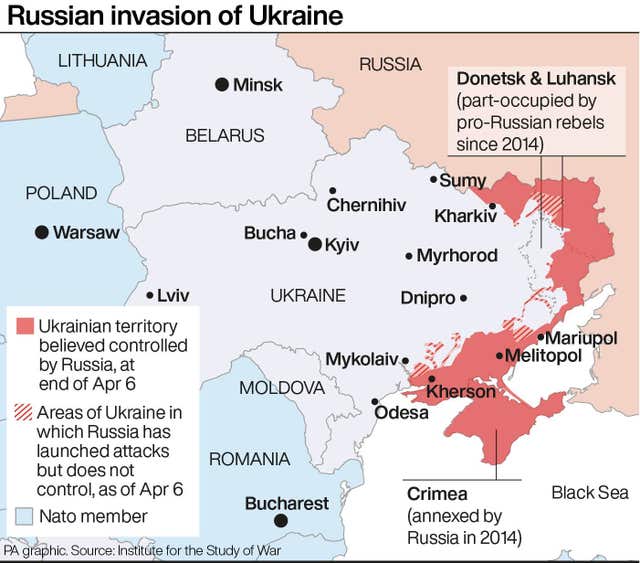Civilians bid to leave eastern Ukraine after deadly attack on train station
Western experts and Ukrainian authorities said that Russia launched the missile which killed 52 people.

Civilian evacuations have gone ahead in parts of eastern Ukraine a day after a missile strike killed at least 52 people at a train station where thousands were waiting to leave the region before an expected Russian onslaught.
Ukrainian President Volodymyr Zelensky demanded a tough global response to Friday’s train station attack in Kramatorsk, calling it the latest sign of war crimes by Russian forces and hoping to prod Western backers to step up their response to help his country defend itself.
“All world efforts will be directed to establish every minute of who did what, who gave what orders, where the missile came from, who transported it, who gave the command and how this strike was agreed,” Mr Zelensky said in his nightly video address, his voice rising in anger.

A Russian Defence Ministry spokesman detailed the missile’s trajectory and Ukrainian troop positions in a bid to bolster the argument. Western experts and Ukrainian authorities said that Russia launched the missile.
Ukraine’s state railway company said that residents of the country’s contested Donbas region, where Russia has refocused its forces after failing to take over the Ukrainian capital, Kyiv, could flee through other train stations on Saturday.
“The railways do not stop the task of taking everyone to safety,” the statement on the messaging app Telegram said.
Deputy Prime Minister Iryna Vereshchuk said 10 evacuation corridors were planned for Saturday in hopes of allowing residents to leave war zones in the eastern regions of Donetsk and Luhansk, which comprise the Donbas, as well as neighbouring Zaporizhzhia.

Photos taken after Friday’s missile strike showed bodies covered with tarpaulins, and the remnants of a rocket painted with the words “For the children” in Russian. The phrasing seemed to suggest the missile was sent to avenge the loss or subjugation of children, although its exact meaning remained unclear.
The attack came as Ukrainian authorities worked to identify victims and document possible war crimes by Russian soldiers in northern Ukraine.
The mayor of Bucha, a town near Kyiv where graphic evidence of civilian killings emerged after the Russians withdrew, said search teams were still finding the bodies of people shot at close range in yards, parks and city squares.

After failing to occupy Kyiv in the face of stiff resistance, Russian forces have set their sights on eastern Ukraine.
Many of the civilians now trying to evacuate are accustomed to living in or near a war zone because Moscow-backed rebels have been fighting Ukrainian forces since 2014 in the Donbas.
The same week Russia invaded Ukraine, Russian President Vladimir Putin recognised the independence of areas controlled by the separatists and said he planned to send troops in to protect residents of the mostly Russian-speaking, industrial region.
Western experts, however, dismissed Kremlin spokesperson Dmitry Peskov’s assertion that Russian forces “do not use” Tochka-U missiles, the type that hit the station.
A Western official said Russian forces have used the missile — and that given the strike’s location and impact, it was likely Russia’s.
Ukrainian authorities and Western officials have repeatedly accused Russian forces of committing atrocities in the war that began on February 24.
A total of 176 children have been killed in Ukraine since the start of the war, while 324 more have been wounded, the country’s Prosecutor General’s Office said on Saturday.
Ukrainian authorities have warned they expect to find more mass killings once they reach the southern port city of Mariupol, which is also in the Donbas and has been subjected to a month-long blockade and intense fighting.
As journalists who had been largely absent from the city began to trickle back in, new images emerged of the devastation from an airstrike on a theatre last month that reportedly killed hundreds of civilians seeking shelter.
Military analysts had predicted for weeks that Russia would succeed in taking Mariupol but said Ukrainian defenders were still putting up a fight.
The city’s location on the Sea of Azov is critical to establishing a land bridge from the Crimean Peninula, which Russia seized from Ukraine eight years ago.





